The Sonic franchise has an image problem. It remains disrespected, discredited, and broadly misunderstood for years, not because his titles are consistently good, but rather because the good titles are often swept away and ignored in favor of snark towards past failures. In this sense, games writers might as well joke about airline food or women drivers. I’m not a marketing wizard, nor do I claim to have all the answers, but I do think it is important to highlight what the problems are and are not. At the very least, the culture could stand to be snarky and dismissive about something that happened six months ago instead of six years.
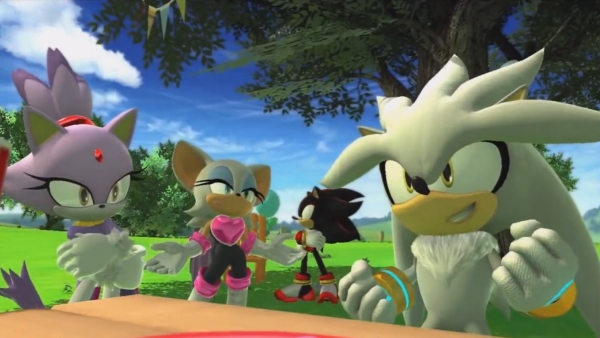
Problem: Sonic’s Friends
Last time it was relevant: Shadow the Hedgehog, 2005 (8 years ago), Sonic the Hedgehog, 2006 (7 years ago)
Where the sentiment typically refers: Sonic Adventure, Sonic Adventure 2, and Sonic Heroes, and Sonic ’06.
(I’m ignoring Sonic & the Black Knight here, as nobody outside of the most dedicated Sonic fans touched that game.)
I’d like to make this perfectly and entirely clear so that there is no confusion:
Sonic’s friends are not, never were, and never will be the problem with Sonic games. If you take issue with writing, fine. That’s a writing issue. If you take issue with how they play, okay. That’s a gameplay issue. But there’s nothing innately wrong with Tails, Knuckles, Amy, Shadow, Silver, Big, Cream, or any other character. It is how they are used.
Sonic story went through a number of phases, from non-existent to upbeat with grim undertones, to bizarrely grim, to Saturday morning cartoon, but the point where it shifted away from non-existent was Sonic Adventure, a game that seems to have a decent story premise, but abysmal execution. It, and many of its successors, ask you to take this menagerie of cartoon animals seriously, but without the subtlety and charm to back it up. At the same time, the game structure was redefined to have you play as all these new and returning characters in very diverse, though ultimately unrefined ways. In effect, it is not the characters that held the game back, but the core design philosophies that were needlessly attached to them, hampered by the realities of time, budget, and technology. It’s like Jessica Rabbit said, they’re not bad. They were just programmed that way.
Since then, Sega has definitely dialed back. Of the last ten Sonic platformers released to consoles and dedicated handhelds, none have introduced new playable characters to the franchise and seven of them only allow you to play as Sonic in the single player (ignoring the duality of classic/modern in Generations and regular/werehog in Unleashed). In the remaining three, the side characters played very similarly to Sonic himself. And to clarify, yes, there have been ten Sonic platformers between now and Sonic ’06.
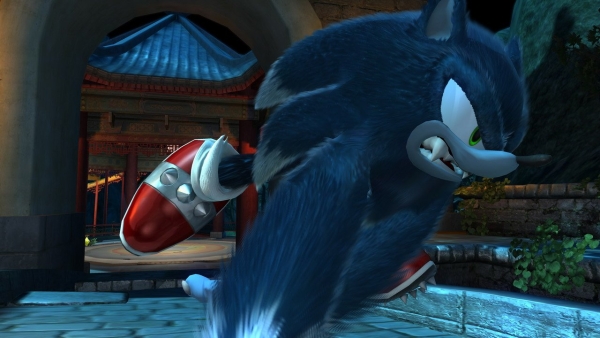
Problem: The Sonic Cycle
Last time it was relevant: Sonic Unleashed, 2008 (5 years ago), Sonic 4 Episode 1, 2010 (3 years ago)
Where the sentiment typically refers: Basically just Sonic Unleashed and Sonic 4 Episode 1, though much of the sentiment probably originated with Sonic Heroes.
You’ll notice above that I only reference two to three games here where that sentiment refers, yet the Sonic Cycle is one of the most heavily cited memes when any games writer talks about Sonic. For something so widely accepted, it sure has a low hit radius.
For the two of you out there who aren’t familiar, the concept of the “Sonic Cycle” is simple: in Sega’s early reveals of a new Sonic game, they highlight familiar, very old-school styles of play that appeal to those who enjoy his classic sidescrolling exploits. People get excited. As the marketing train continues, Sega reveals that game contains diverging gameplay styles and new characters. This excitement turns to skepticism. Upon final release, the new gameplay elements are pervasive and unpolished, bogging down the whole experience. The game does not live up to the original standards expected of it, and people are disappointed. Then, when the next Sonic game is initially revealed, the emotional roller coaster repeats.
The Sonic Cycle first gained popularity around the release of Sonic Unleashed. In spite of poor pacing, arbitrary roadblocks, and pointless quick time events, what most people took away from that game was the werehog, the hulking brawler platformer gameplay with a character designed to appeal to a younger audience. It lived on through the next major release, Sonic 4 Episode 1, though I’m willing to call the reception to that game mixed. But since then, where has it honestly been applicable? Recall, the Sonic Cycle is characterized by three qualities: initial excitement, undesirable reveals, and eventual disappointment.
Sonic Colors made no attempts to grab nostalgia, and never seemed to get overwhelming press buzz before or after its release. It introduced the Wisp mechanic, short transformations for Sonic that levels were designed around utilizing. Response was generally fairly positive, and most serious criticism lies with level design. The Sonic Cycle does not apply here.
Like Sonic 4 Episode 1, Sonic Generations is a complete nostalgia grab and went on a full marketing campaign as such, not really advertising or delivering on any sort of gameplay twist. The level themes don’t live up to their potential diversity, and the final boss is absurdly bad, but critical reception was consistently positive. Nope, doesn’t apply here either.
Sonic 4 Episode 2 improved parts of the original, but was met with harsher reviews. This would possibly help it apply here, but Episode 2 was almost entirely out of the game zeitgeist through its entire development that there just wasn’t any sort of excitement for that game at all. There’s an argument that could be made, but I’m going to say, no, no Sonic Cycle here.
Sonic Lost World, I’m going to say the same thing as Sonic 4 Episode 2. The responses were mixed enough to allow some wiggle room for argument, but as that game stands, nobody but Sonic fans cared about it before or after.
And of course, as an honorable but tangential mention, pretty positive response to both of Sumo Digital’s All-Stars Racing games.
So, in this case, it’s hard to say that the Sonic Cycle still has any purpose. Sonic games still receive mixed reception, though it definitely trends more on the positive side; however, unless Sega is specifically playing the nostalgia card, nobody in the games media seems to care.
Funny enough, the people complaining about the Sonic Boom character redesign would also be the people who would completely ignore if it retained the current look in a new CG cartoon series. Crazy how the status quo doesn’t matter until something goes awry, isn’t it?
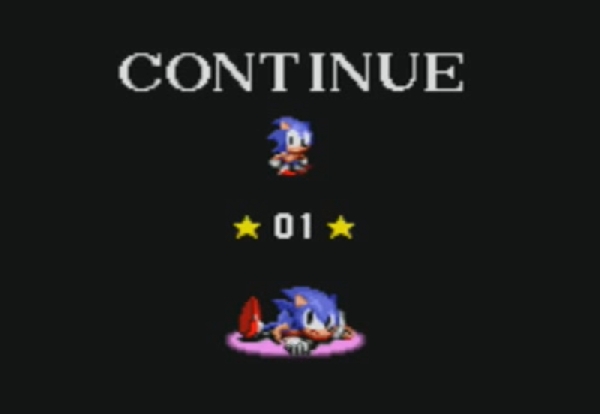
Problem: Sonic Needs to Die
Last time it was relevant: Pretty much Shadow the Hedgehog onward.
Where this sentiment typically refers: Whatever the latest Sonic game is.
You see this kind of editorial pop up from time to time, 10 game characters that need to die or series that need to end. This is a flawed premise. Often, it is the author trying to preserve some past memory or image of a franchise, and trust me, there is no series people cling to the past for more than Sonic. While it is true that seeing another middling sequel on shelves might cause you to roll your eyes, but these franchises continue to exist for a reason, they still sell, and they sell because enough people like them to allow their continued existence. Broadly speaking, people still like Sonic, or want to like Sonic, or still have some sort of leftover affinity for Sonic. If that suddenly ended, it wouldn’t benefit Sega. Sonic still makes money for them. It wouldn’t benefit the people that still like and buy those games. Continuing the series wouldn’t hurt the person writing the article.
The only situation where this argument makes some sense is when continuing a franchise diverts costs away from other projects. In theory, Iizuka and Sonic Team could be working on Shenmue 3 right now (yes, I know that it wouldn’t be their team, nor is that remotely sane), but a hiatus and a death are two very different things. If not for my love of discussing Sonic as a hobby, I would love to see the franchise take a break and reassess some of its design choices while focusing on an unrelated game.
Sonic should not “die,” because he’s a minor nuisance to a select, vocal few. Even in the face of criticism, he remains a firm video game icon that has seen ups and downs. If he “dies,” then he can only exist as a memory in the minds of aging players. Yet if he continues, there is always the chance, however slim, that he regains his footing as he did in Colors and Generations, and keep pace as we expect him to.
As I said at the beginning of this editorial, there is no clear solution to this culture of negativity towards Sonic. For a company like Sega in its current state, the cost and complexity of making a game as polished as Generations consistently is extremely difficult, and further playing up the nostalgia angle doesn’t do much to help the series move forward. In some ways, Sonic Boom represents a sort of side-step reboot and an attempt to gain ground in fresher markets that haven’t yet formed cynicism about the franchise. It is definitely a strategy with a lot of potential and all the same potential pitfalls. As fans, players, watchers, and critics, unless we are clear about what the problems actually are in the face of easy scapegoats, the series cannot even hope to regain the traction and respect it once held.
Ad:
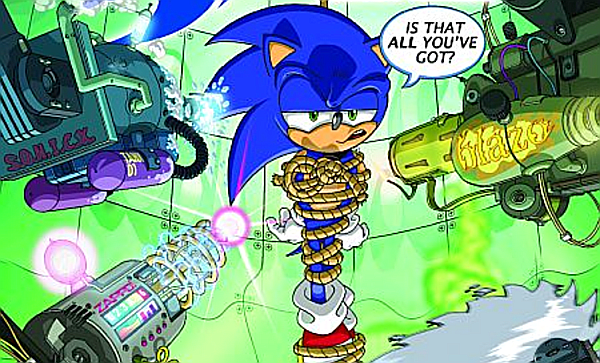
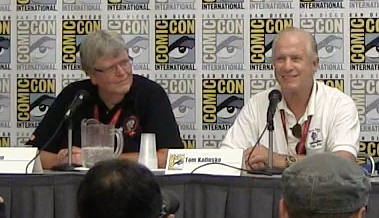
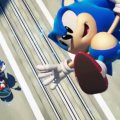



It really stinks I have to write this with a pen-name, but I do.
The problem is Sega has too few first-party developers and Sonic Team suffers from constant brain-shuffling between strategies in Europe and Japan. There is a lack of first-party talent to drive great games, and so the brand managers run around trying to monetize on the fringes.
Sega needs to stop outsourcing and return to one consistent design language across game development teams. We haven’t had that since shortly after the Dreamcast era, and since the Xbox/PS2 era Sega has become as watered down… as Sonic’s Friends.
Source: A Sega corporate partner that tries to tell them this behind the scenes – and I suspect SoA just doesn’t have any power anymore in the hierarchy, so their word counts for little these days. SoA reports to SoE and SoE to SoJ – and they all run around like chickens lacking heads. It’s sad. I went from a gamer to an exec, and I can’t help fix this.
XD An interesting sidestep completely around the point of my article, but sure. If you want to suggest that Sega’s business side is kind of effed, I think it’s been hard to refute that since the latter days of the Genesis.
Wasn’t my intention to side-step, but rather to show how the business is what is screwing up the creative side.
Same thing happened to Apple in the mid ‘90s. Apple had a cast of products that just spiraled out of control. They didn’t focus on a core product and build it in-house. They kept outsourcing and building on top of a product set that they knew was confusing and – while great at the core, needed focus before a new, decisive generation could emerge.
The fact that Sonic Team hasn’t gotten a single Hedgehog Engine game on mobile, is proof positive.
Sega did get back together under Bernie. Bernie ran out of money and SoJ wouldn’t let him follow through. This is why the Dreamcast launch was so great – and then fell apart after Bernie was axed.
You need strong leadership to stop outsourcing, rein in the product, and make a great game that focuses on what you do best. From there, it becomes much easier to axe some ancilary characters, cultivate others, and build a new one or two.
If I were Sega, I would make Hedgehog Engine scale console and mobile, and churn out one first-party 3D game. Hire Christian Whitehead and have him lead a 2D Sonic Team to create new retro Sonic games in the (authentic) image of Sega’s glory days.
I’m not paid enough for that advice, sadly.
I agree that Sega hasn’t proven their corporate culture to be the most savvy, but my point here was less about which Sonic games were and weren’t good, but how the broader games-enthusiast cultural response is based on fairly outdated ideas and bizarre misdirection towards scapegoats, sending the wrong message to developers on what is wrong and right with the series. One philosophy I always live by is that it’s okay to make fun of me as long as it’s funny; I’m okay with the current media culture prodding at Sonic’s faults, so long as those faults are still relevant.
I’m… actually not sure what exactly porting the Hedgehog engine to mobile would accomplish, though a quick Wikipedia search suggests they did for Fantasy Star Online 2 for iOS and Android; though I kinda feel like I wouldn’t want to play a full 3D Sonic game, or even a 2D Sonic game on my phone or tablet.
I would definitely like to see what Christian Whitehead could do as a level designer; he seems like a solid engine-rebuilder, but I don’t know his chops in actual game design; but what little I know about Japanese corporate structure kind of suggests that may be a non-starter, unless Iizuka had direct oversight; though ultimately, I’m not sure if that would herald in a new era of Sonic as you might hope. It would make a certain audience happy, much as Mega Man 9 did, but that audience was just interested in the little pink Baskin Robbins tasting spoon, and then just kind of moved on to other things. I think this is why they’ve decided to take this risk with Sonic Boom, to maintain what Pokemon’s done for decades and make it a full brand again outside of games in order to attract fresh blood.
Lovely piece that really gets to the heart of Sonic’s image problem. It’s a shame the only real antidote to this perception is a solid string of not just good, but GREAT games. Something that seems completely out of reach for Sega. One minor niggle:
You have “Response was generally fairly positive” for Colors and “critical reception was consistently positive” for Generations. How can this be, considering that Colors has a higher meta critic than ANY version of Generations? Colors was better or at least equally well received than generations.
I try not to use Metacritic scores to compare games. I know Metacritic can be a useful tool if you need games to be broken down into something quantifiable, but for me, it’s just not a tool I feel comfortable using in that way. For me, I just kind of just have to go with what I’ve personally read, experienced, heard about in podcasts, etc… It’s messier, but it’s what I feel comfortable using. Either way, it doesn’t -really- influence the end result, and I’m not especially interested in trying to compare Sonic Colors and Sonic Generations here.
This is bizarre to me. You’re not comparing the games, you’re comparing their critical reception. Also, your method is peculiar in that the podcasts and articles you select to give weight might be biased in certain ways. Especially in an article like this where you’ve singled out the critical reception of titles as an argument against why the sonic cycle is no longer relevant. The fact that colors and Generations were both received almost equally positive is a great boon to your point. Why let your apparent bias get in the way of that?
Metacritic boils everything down to a quantifiable number. The feel behind the reviews may not reflect that one number should be above another.
And what is a ‘bias’ in a game review? A review is all subjective. It’s supposed to have bias.
Pretty much. There really is no such thing as an objective review when consuming an art product, unless the review itself is purely a list of statistics about the game as Digital Foundry would put out. Individual sites and individual reviewers have differing stances on what each number represents, so Metacritic’s not necessarily a reliable formula to use for objective comparison. The reflection on my reviews aren’t either, but for the purposes of the point I wanted to make in the editorial, it was good enough.
Again, we aren’t talking about the reviews themselves, but the critical reception of the title. Don’t want to use metacritic? Fine, how about Game Rankings? Even there, their scores are practically identical.
Your method sounds basically like cherry picking. Something like critical reception really isn’t an opinion. It’s not something you can change because of a different perspective. It just is.
I…. guess? I mean, if you’re skeptical of the way I’m interpreting critical response, that’s your prerogative as a reader. But unless you’re contesting that Sonic Colors or Generations was not received well critically, and therefore is applicable to the Sonic Cycle, and that the Sonic Cycle itself remains relevant for that reason, it really doesn’t change anything in the editorial.
I’m not sure what you’d be trying to argue. That I should be using Metacritic to start comparing games in articles that aren’t about comparing games?
I’m saying that if you’re going to cite the critical reception of games as part of an argument, you could have been more accurate. Again, I’m not asking you to compare the quality of the games; that’s irrelevant. But critical reception is part of your talking point and as much as you seem loathe to admit, review aggregate sites are a perfectly legitimate gauge of this.
The fact that you went from “generally fairly positive” with Colors to “consistently positive” with Generations is a narrative. It makes it seem like there was a build in positive reception when in fact there wasn’t. In an article about the franchise’s reputation, this is relevant.
I feel dumb for bringing this up as it amounts to semantics. Thbbth.
Honestly, I don’t use or find value in reviews that I once did. I don’t intend to imply dirty business going on in games reviews anymore, though much of my critical exposure anymore is through discussion via podcasts, a format that you really -can’t- quantify. I cannot cite specific quotes and moments considering that it was several years ago, but as it stood, Colors, like most Wii games, was so far out of the zeitgeist that it just wasn’t mentioned much. Conversely, Generations, a game that hit many more platforms, at least got brief, occasional, though almost always positive response.
Though many consider aggregate sites a valuable resource, it’s only valuable if you want the direct, blunt snapshot of how people responded through whatever algorithm the site feels fits with their system. It’s not especially valuable if you want to know what people -say- though they do often provide links to the actual online reviews. As someone who doesn’t like the idea of a review score in the first place, I don’t feel compelled to accept that as my metric of industry response.
Well, that’s not entirely true. I’m more of a solid Recommend/Maybe/Don’t recommend type of person. I just don’t see the value of having an eight versus a nine when I’m trying to determine if a game is worth my time, money, and attention.
Here’s where someone needs to point out that nothing Sonic does is ever going to earn it the “respect” it “used to have”. Bitching about Sonic is just too much fun for gaming’s culture, these days. And because the fanbase is so divided, even if a game ever came out that pleased the most vocal (read: demanding) portion of the Sonic fanbase – mostly that portion being its hardcore classic fans – there’d always be those other sides who were disappointed that Sonic’s not what they want.
We’re kind of seeing that presently… now that the boost games are really over-staying their welcome. A lot of what SEGA is doing now is because they’re finding out that a lot more people liked the “bad” Sonic games than they thought. And even in the case of people who don’t like them, they like the potential.
What SEGA needs to do, really, is just accept that nothing they do with this franchise will be safe from criticism. And what fans need to do now is accept that SEGA will never throw out the sides of the fanbase they don’t like. Not just because SEGA aren’t as petulant and excluding of people, but because they stand to make too much money.
And we could all benefit from dropping the judgmental attitudes we take with each other in this fanbase. Start realizing that every Sonic game’s got its fans, and nobody’s better than anyone else over their tastes in Sonic The Hedgehog games. It’s all going to be what it is, we’re all going to get Sonic games that we like as time goes by… Let’s just stop freaking out about it.
Here is the deal. Original Sonic fans knows the Sonic world by heart. That is the games, cartoon, animation, and anything else uptil the Dreamcast.
Shadow the hedgehog was a great game. Last of Sonic-Moddana.
When growing up their are tons of issues. Issues I wish not to publish here right now. We call those tangents, or better yet Civics. All Sonic games are great it is just that with these “tangents” ( A word I learn from Senn ); people ( the original fans ) can not enjoy Sonic at all.